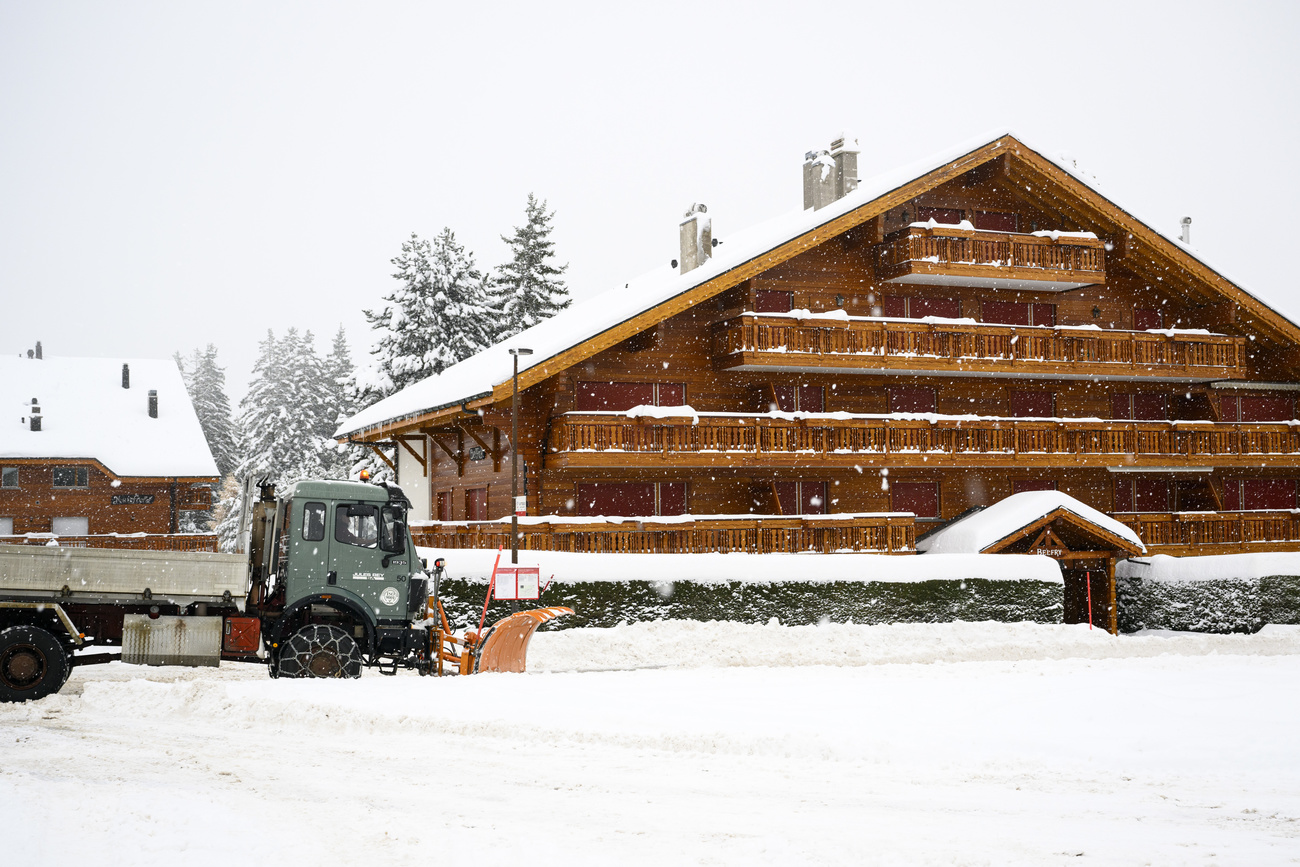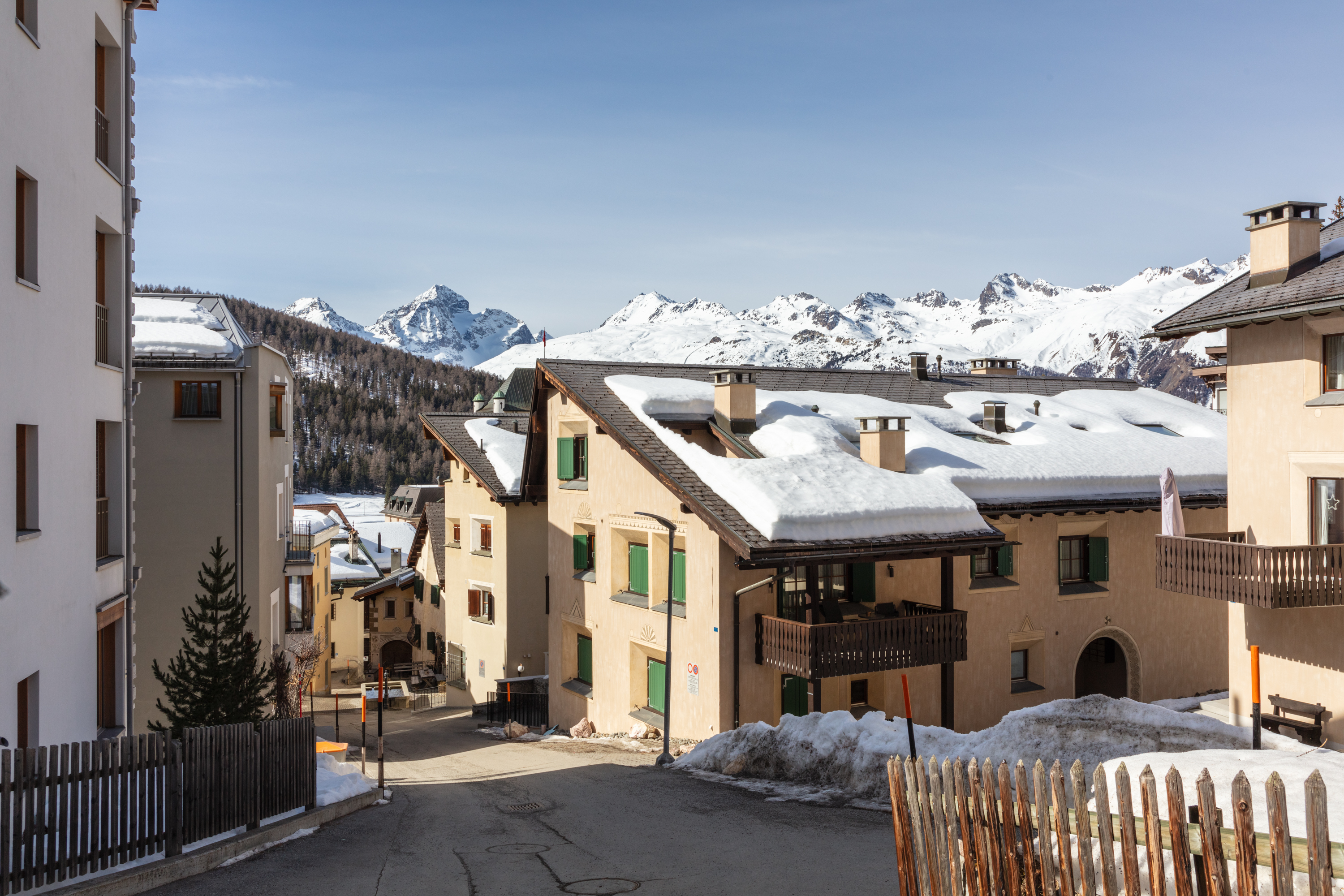
Swiss luxury chalet market runs out of steam

Multimillionaires around the world could see some bargain prices for luxury Alpine chalets in Switzerland this year, according to UBS bank.
“We expect a slight decline in prices in the luxury segment, in the low single-digit percentage range,” UBS says in its Luxury Property Focus 2024 report.
The reasons behind this are a flagging global economy, the rise in value of the Swiss franc against other currencies and an increase in domestic mortgage interest rates, following central bank rate hikes from -0.25% to a high of 1.75% since 2022.
“Advertised properties are garnering less interest, and asking prices are being increasingly challenged by prospective buyers. If sellers are pressed for time, they may have to accept price reductions,” says UBS real estate economist Katharina Hofer.
High-end property in idyllic Swiss beauty spots has demanded higher prices in the past few years, during a period of rock bottom interest rates. But price momentum is slowing.
Interest rate impact
A year ago, real estate experts were boasting that demand for properties in the luxury segment was at an all-time high. But by the end of 2023, prices had risen by just 2%, compared to 10% in 2022, according to UBS research.
In September 2022, Swiss interest rates awoke form a period of hibernation to enter positive territory for the first time in seven years. Since then, they rose to 1.75% before dropping to 1.5% in March of this year.
Billionaires are able to brush off rising interest rates as a minor irritation, states the UBS Luxury Property Focus report. The number of billionaires in Switzerland increased 10% last year, the bank calculates.
This means that properties priced above CHF10 million ($11 million), which billionaires can afford, should continue to hold their value. Properties most vulnerable to rising interest rates are those priced at around CHF5 million.
Relief for locals
Rising geopolitical tensions and increasingly uncertain economic conditions throughout the world have made some investors more cautious, according to British luxury real estate agency Knight Frank.
Poor economic conditions have dampened appetite among the rich for making a large property investment. Half of the respondents to the Knight Frank Ski Property Report say the economic downturn has dented their enthusiasm for buying a new Alpine chalet.
This might come as a relief to some Swiss Alpine towns and villages, such as Pontresina, near St Moritz, which has seen locals priced out of the property market by wealthy foreigners.

More
Locals driven out by luxury homes in Swiss mountains
Laws to restrict the number of second homes being built by millionaires is doing little to ease this problem, as SWI swissinfo.ch reported last month. Wealthy homeowners are simply converting existing buildings into luxury properties, thus reducing the housing supply for people on normal incomes.
The high-end resorts of St Moritz, Verbier and Gstaad have retained their position as the most sought-after regions for wealthy foreign home buyers. But other areas have developed as luxury property hotspots in the past ten years.
The central canton of Zug has drawn in more wealthy foreigners with its generous tax breaks, says UBS. But the fastest-growing area in the past decade has been the resort of Andermatt, in canton Uri, which has seen large-scale investment in luxury infrastructure.
Supply and demand
Knight Frank still sees enough demand to keep pace with the number of luxury homes available on the Swiss market. “The pandemic-induced Alpine mini-boom is fortunately ending with a fizzle, rather than a bang, as limited supply keeps a floor under prices in most markets.”
This means there is still plenty of life left in the luxury property market in Switzerland despite the price slowdown. UBS reports that prices are still 25% higher than pre-Covid levels.
And while gloomy economic conditions have made some investors more price conscious, the threat of escalating conflicts has only increased the allure of neutral, stable Switzerland.
“Looking ahead into 2024, the current geopolitical situation, as well as forthcoming elections in over 50 countries this year, are creating greater levels of uncertainty, which is proving beneficial to the wider Swiss market,” Alex Koch de Gooreynd, a Swiss property expert for Knight Frank, told SWI swissinfo.ch.
“Clients are now exploring the lakeside cantons and certain year-round ski resorts, drawn to the stable and safe environment that Switzerland can offer.”
Edited by Virginie Mangin/ts

In compliance with the JTI standards
More: SWI swissinfo.ch certified by the Journalism Trust Initiative


























You can find an overview of ongoing debates with our journalists here . Please join us!
If you want to start a conversation about a topic raised in this article or want to report factual errors, email us at english@swissinfo.ch.